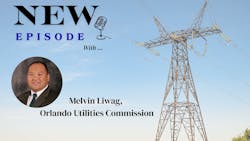Lessons from the Field: Technology, Resilience, and Responsibility at OUC
Watch the Episode Now!
In this episode of the T&D World Live podcast, host Nikki Chandler welcomes Melvin Liwag, Senior Engineer at the Orlando Utilities Commission (OUC), for an in-depth conversation about his career journey, OUC’s evolution, and how modern utilities are improving reliability, resilience, and environmental responsibility.
Liwag begins by recounting how his fascination with technology started at age 14, when his teacher introduced him to hand radio. That early experience sparked a lifelong interest in electronics and ultimately led him to study electrical engineering at the University of Central Florida. While many of his peers pursued careers in the defense and space industries, Liwag was drawn instead to power systems — wanting to use his engineering skills to improve lives.
After graduating, Liwag landed his first job with the City of St. Cloud’s municipal utility. Working at a small utility proved invaluable; with a staff of only a few engineers, he wore “15 hats,” learning everything from line design to dispatch operations. He describes the early 1990s as a very different era — one of carbon-copy trouble tickets, manual outage calculations, and paper maps instead of laptops or outage management systems.
A few years later, St. Cloud’s utility operations were taken over by OUC, and Liwag officially joined the organization he had once hoped to work for. Shortly afterward, he was offered a position as an operations engineer — complete with a take-home vehicle and a pager for after-hours emergencies. He vividly recalls using physical maps spread out on his truck’s hood to trace circuits during outages and coordinating restoration efforts using corkboards and colored push pins.
As technology advanced, OUC transitioned to digital outage management systems around the year 2000, followed by the establishment of a formal distribution control center. Liwag played a key role in developing OUC’s operational procedures, particularly during the devastating 2004 hurricane season when four major storms — Charley, Frances, Ivan, and Jeanne — hit Florida in rapid succession. He helped coordinate restoration across Osceola County and worked nearly 100 consecutive days without a break.
Reflecting on how much OUC has evolved since then, Liwag explains the meaning behind the utility’s tagline, “The Reliable One.” Reliability, he says, is not just about system performance but also about safety, communication, and excellence. With more than 280,000 customers — including Orlando International Airport, major hospitals, and world-renowned theme parks — OUC faces unique challenges. The Central Florida region sits in one of the most lightning-prone zones in the United States, making infrastructure hardening and system automation critical priorities.
Liwag details several major improvements that have strengthened OUC’s grid, including expanding underground networks for critical customers, deploying automatic transfer switches, and implementing Ubiquia distribution transformer monitors that provide real-time visibility into voltage, load, and system anomalies. These tools, he explains, have transformed outage response and customer communication. He shares an example involving a large plastics manufacturer whose new equipment overloaded OUC transformers — a problem the new monitors helped quickly diagnose and resolve.
Liwag’s story illustrates how a utility can evolve from manual systems to modern digital operations while staying grounded in its mission of service, safety, and environmental care. His reflections offer both a historical perspective on the power industry’s transformation and a personal reminder that reliability is built on dedication, adaptability, and purpose.
